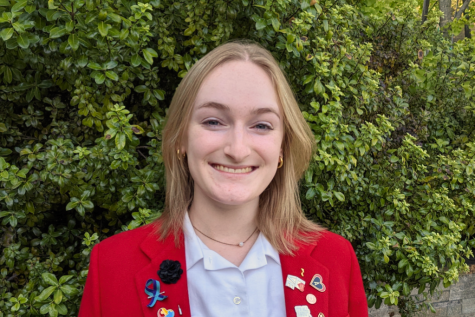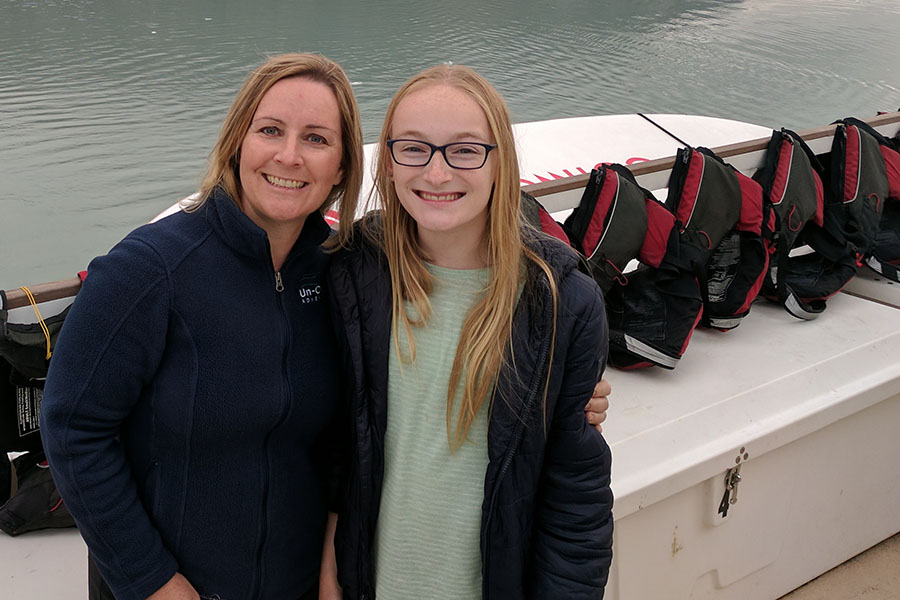Questions about teaching I’ve always wanted to ask my mom, Dr. Liz Krider
On a family trip in 2017, Dr. Krider (left) and the author enjoyed the opportunity to explore Alaska.
While Dr. Liz Krider (aka, my mom) and I share a living space, we don’t share everything. Between her SciSearch class with seniors and her first year teaching freshman biology alongside Ms. Tennity, my family and I always get a daily update on my mom’s classes during family dinner, but she doesn’t always share the details.
My mom and I have a close relationship. We visit every day, share our frustrations and victories and go on the occasional See’s Candies run together. Lately, I’ve found myself curious about what it’s like to be a teacher. This year, school has taken on a new meaning with at-home computer set-ups and brand new routines. Because we’re all in this together, I thought it’d be a good time to ask my mom about what it’s like to be a teacher in the era of remote learning.
What do teachers want students to understand about what it’s like to be a teacher, especially during online school?
I really like it when a student tries her best to engage, even when there’s Zoom fatigue. I also appreciate it when they’re prepared for class and when they’re willing to raise their hands to participate. When students add things from their own experience, I really like it because it shows their interest in connecting with the material.
At the end of the day, what’s the one thing you hope your students take away before they press “Leave Call”?
The main thing I want to convey is how much fun I’m having with my students. Although there are challenges with Zoom, I think we’re having a great time so far. For an extrovert, Zoom teaching is really uncomfortable, so I really appreciate when students engage because it makes it fun for everyone. And, hopefully, they have more fun in the process.
How do you feel about students asking questions?
I love it when students ask in-depth questions! It shows to me that the students are engaged and are connecting with the material and are willing to speak up. It’s just as hard for me, just as it is for them, that we can only meet in two dimensions instead of three.
When introducing a new topic, what is your thought process around organizing the material?
I select material in hopes of an “aha” moment. My hope is that everything I introduce will have a practical application in a student’s life, even the unexpected content. One of the most difficult things about teaching online is engagement, which I try to entice by creating connections with the students. When students participate, it becomes a conversation, which becomes engagement. Now, we have a higher chance of connecting in class, which results in retention, the “aha” moments and gaining skills that are transferable to other areas of life.
Your two classes are obviously quite different. What do you like most about this?
The most interesting thing is the contrast between my two teaching experiences. Biology is a large, foundational course, while in SciSearch, I’m more of a coach in a class that focuses on what the small group of students in my class want to learn. I’m a teacher for 9th graders and a coach for 12th graders, and I love both experiences for what they are.
What do you think is the most important skill girls can get from attending Flintridge?
As a scientist, I love to discover, and having students discover themselves while at FSH is the most rewarding part of teaching. I think it’s very valuable when a girl realizes that she has strengths and weaknesses, and that with the help of her teachers, she can do something about both. I hope that students recognize that teachers care about their experiences and are rooting for the girls and that staff and faculty are resources for them.

Julia Krider is a senior at Flintridge Sacred Heart, and is the Shield’s managing editor this year. She has been part of the paper since sophomore year,...

